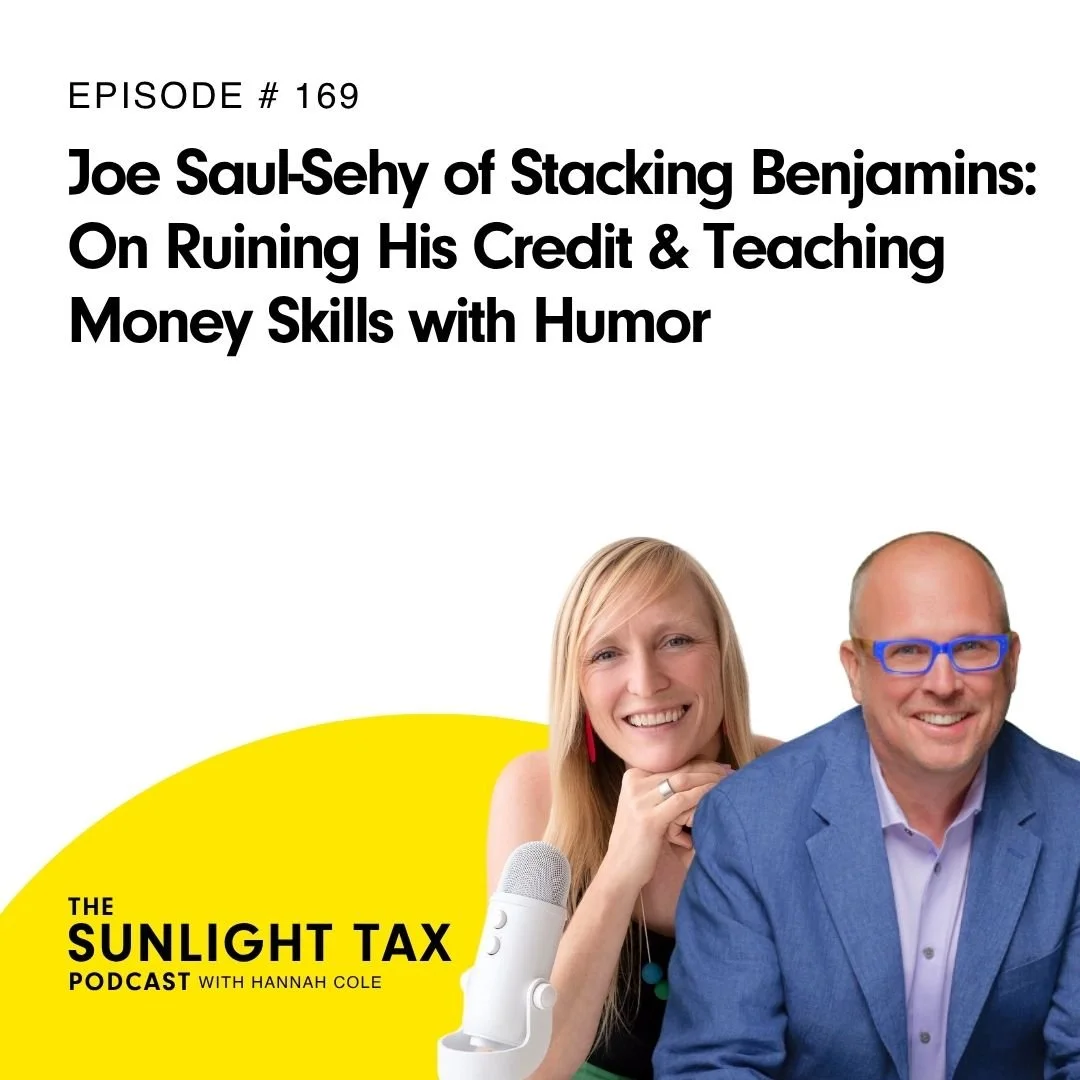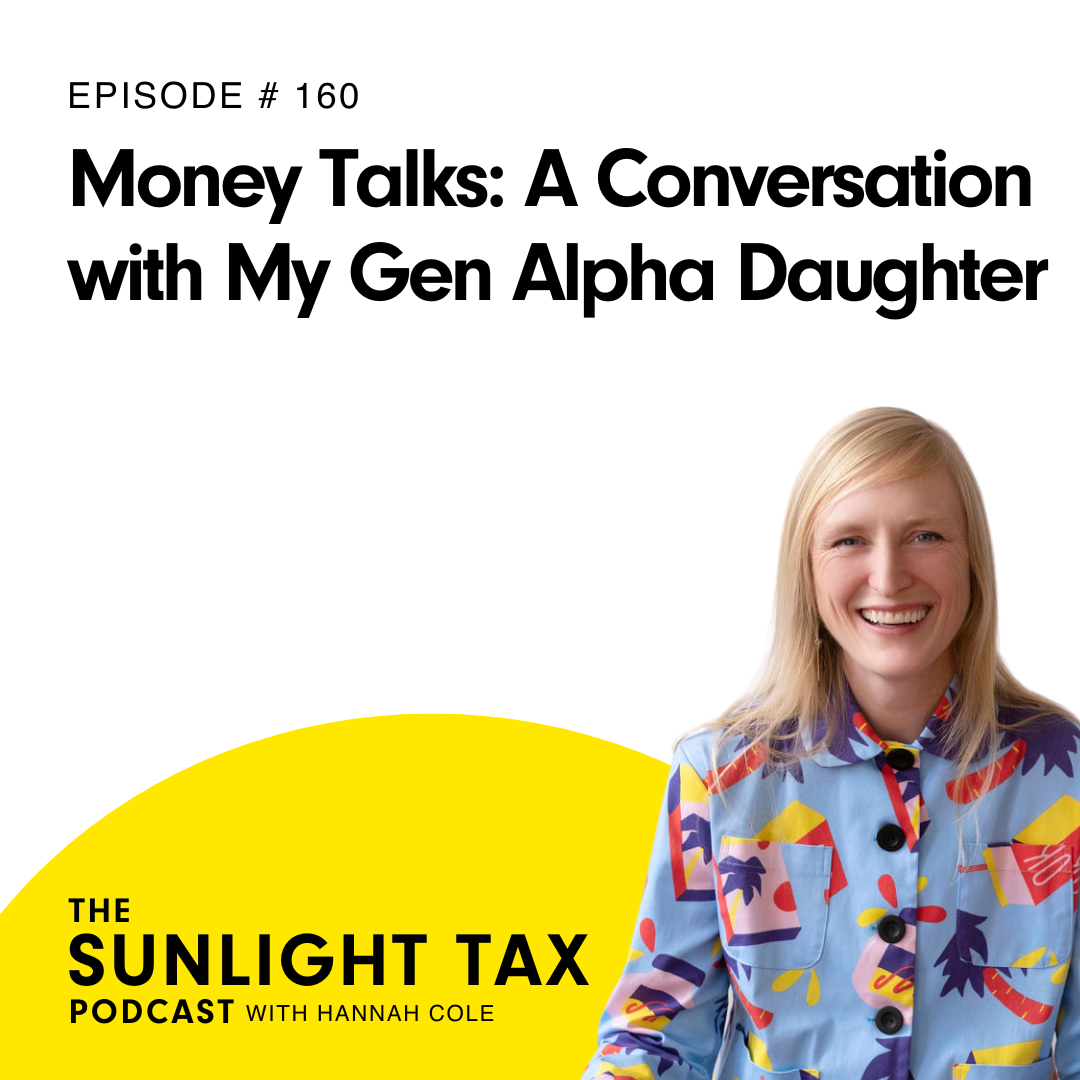
THE SUNLIGHT TAX BLOG:
Tax and Money Education for Creative People, Freelancers and Solopreneurs
search A TOPIC
Categories
- Business Management 17
- Creative Specific 3
- Estimated Quarterly Taxes 5
- General Economy; Tax Policy and Legislation 47
- Get to know Hannah Cole 8
- Interviews and personal stories 27
- Personal Finance 23
- Personal and Career Development 20
- Practical and Tactical Tax 54
- Retirement and Future Success 27
- Sunlight Podcast 149
- Tax Deductions for Freelancers and Self-Employed 8
- the Sunlight Tax Podcast 32
Joe Saul-Sehy of Stacking Benjamins: On Ruining His Credit & Teaching Money Skills with Humor
Listen and Subscribe Here
In this episode of the Sunlight Tax Podcast, I sit down with Joe Saul-Sehy, host of the Stacking Benjamins Show, for a deep dive into the world of personal finance and the emotional side of money management. Joe shares insights from his journey writing a personal finance book, and we explore topics like budgeting strategies, creating financial systems that work, and learning from our biggest money mistakes.
We also discuss how mindset and emotions affect your money decisions, why community and accountability are essential for building wealth, and practical tips for artists and freelancers managing irregular income. Throughout the conversation, we highlight the importance of defining your financial goals, your core money values, and how having the right support network can help you actually achieve them.
Listen and Subscribe Here
In this episode of the Sunlight Tax Podcast, I sit down with Joe Saul-Sehy, host of the Stacking Benjamins Show, for a deep dive into the world of personal finance and the emotional side of money management. Joe shares insights from his journey writing a personal finance book, and we explore topics like budgeting strategies, creating financial systems that work, and learning from our biggest money mistakes.
We also discuss how mindset and emotions affect your money decisions, why community and accountability are essential for building wealth, and practical tips for artists and freelancers managing irregular income. Throughout the conversation, we highlight the importance of defining your financial goals, your core money values, and how having the right support network can help you actually achieve them.
Also mentioned in this episode:
06:23 Tools for Financial Management
07:22 Learning from Financial Mistakes
13:07 Navigating Financial Challenges
24:46 The Power of Timelines in Financial Planning
26:30 Defining 'Best' in Financial Goals
33:46 The Emotional Side of Money
44:41 Creating a Sustainable Income Strategy
Takeaways
Tech tools can simplify financial management.
Budgeting is essential for financial stability.
Personal stories of financial mistakes can be motivating.
Learning from financial advisors is key to success.
The emotional side of money impacts decision-making.
Defining financial goals helps prioritize spending.
Community support is vital for financial success.
Artists and Creatives need to value their work and manage income wisely.
If you enjoyed this episode, please rate, review and share it!
Every review makes a difference by telling Apple or Spotify to show the Sunlight Tax podcast to new audiences.
Links:
Join my free class: Make Taxes Easier and Stash an Extra $152k in Your Savings
Check out my program, Money Bootcamp
Link to pre-order my book, Taxes for Humans: Simplify Your Taxes and Change the World When You’re Self-Employed.
Link to pre-order my workbook, Taxes for Humans: The Workbook
Money Talks: A Conversation with My Gen Alpha Daughter
Listen and Subscribe Here
In this episode of the Sunlight Tax Podcast, I had the joy of interviewing my daughter, Farrah, about her very first job and everything she’s been learning about managing money. We talked about the excitement of earning her own income, the value of saving and starting a Roth IRA early, and how taxes work. We even touched on the idea of net worth.
Farrah shared some really thoughtful insights about spending wisely and why she thinks financial education is so important for kids her age (Gen Alpha). It was also fascinating to see how her perspective reflects some of the generational shifts in how we think about money.
Listen and Subscribe Here
In this episode of the Sunlight Tax Podcast, I had the joy of interviewing my daughter, Farrah, about her very first job and everything she’s been learning about managing money. We talked about the excitement of earning her own income, the value of saving and starting a Roth IRA early, and how taxes work. We even touched on the idea of net worth.
Farrah shared some really thoughtful insights about spending wisely and why she thinks financial education is so important for kids her age (Gen Alpha). It was also fascinating to see how her perspective reflects some of the generational shifts in how we think about money.
Also mentioned in today’s episode:
00:00 Introduction to Money Conversations
03:12 First Job and Earnings Insights
06:17 Understanding Roth IRA and Compound Interest
08:56 Navigating Taxes and Financial Responsibilities
11:43 Defining Net Worth and Wealth
15:36 Lessons on Spending and Saving
18:05 The Importance of Financial Education
19:08 Reflections on Generational Financial Preparedness
Takeaways
Farrah's first job was a significant milestone in her understanding of money.
Earning income brings excitement but also the responsibility to save.
A Roth IRA is a powerful tool for long-term savings due to compound interest.
Understanding taxes is crucial, as they are a personal responsibility.
Saving money requires discipline and foresight, especially for young people.
Teaching kids about money management can empower them for the future.
Generational differences exist in financial preparedness and knowledge.
If you enjoyed this episode, please rate, review and share it!
Every review makes a difference by telling Apple or Spotify to show the Sunlight Tax podcast to new audiences.
Links:
My #1 Tip to Make Your Kid a Millionaire
Link to pre-order my book, Taxes for Humans: Simplify Your Taxes and Change the World When You’re Self-Employed.
Link to pre-order my workbook, Taxes for Humans: The Workbook
Get your free visual guide to tax deductions
Imagine (Sneha Shrestha): Street Art, Authenticity, and Connecting Savings to Creative Freedom
LISTEN & SUBSCRIBE HERE
Imagine (Sneha Shrestha): Street Art, Authenticity, and Connecting Savings to Creative Freedom
Imagine (Sneha Shrestha) is an artist, educator and social entrepreneur from Kathmandu, Nepal. She established Nepal’s first Children’s Art Museum and worked at Artists for Humanity. Sneha recently graduated from Harvard Graduate School of Education with a Master’s degree in Education.
Sneha is also known as IMAGINE in the art world and has established herself as Nepali street artist meshing the Nepali alphabet and the Boston graffiti scene. Imagine has redefined the Nepali alphabet and given it a new identity through graffiti. Being the first to mesh American Graffiti with Nepali Alphabets, she has shown her work in several exhibitions, commissioned works and public walls around the world including Boston, San Francisco, Bali, Istanbul, Geneva and Copenhagen.
On today’s episode, Imagine joins me to talk about her art and her entrepreneurial journey including managing her money as an artist and creative entrepreneur. We talk about being real, what savings opens up for your creativity, and what success actually looks like.
LISTEN & SUBSCRIBE HERE
Imagine (Sneha Shrestha) is an artist, educator and social entrepreneur from Kathmandu, Nepal. She established Nepal’s first Children’s Art Museum and worked at Artists for Humanity. Imagine recently graduated from Harvard Graduate School of Education with a Master’s degree in Education.
Sneha is also known as IMAGINE in the art world and has established herself as Nepali street artist meshing the Nepali alphabet and the Boston graffiti scene. Imagine has redefined the Nepali alphabet and given it a new identity through graffiti. Being the first to mesh American Graffiti with Nepali Alphabets, she has shown her work in several exhibitions, commissioned works and public walls around the world including Boston, San Francisco, Bali, Istanbul, Geneva and Copenhagen.
On today’s episode, Imagine joins me to talk about her art and her entrepreneurial journey including managing her money as an artist and creative entrepreneur. We talk about being real, what savings opens up for your creativity, and what success actually looks like.
Also mentioned in today’s episode:
Imagine’s background 1:10
Learning fast and failing fast for success 8:17
Perfectionism and why it’s holding you back 20:13
How street art is different than gallery art 26:24
What Imagine has found most useful when managing her money as an artist 32:04
If you enjoyed this episode, please rate, review and share it!
Links:
https://www.instagram.com/imagine876/
Paddy Johnson: Real Talk on How to Succeed in the Arts
LISTEN & SUBSCRIBE HERE
Paddy Johnson: Real Talk on How to Succeed in the Arts
Can you solve the art world’s problem’s for us in one sentence, Paddy?
“Ask for more.”
Paddy Johnson is a writer, educator and the founder of VVrkshop, an online platform designed to help artists and art professionals connect with other artists, get more shows, residencies and grants.
In today’s episode, Paddy and I talk about some of the inherent problems facing professional artists today and why it’s so important to build a strong network and community when working as a career artist. Paddy unlocks the real reason you should be sending a weekly newsletter, makes a startling confession, talks about her “24 hour fix,” and even makes me cry.
LISTEN & SUBSCRIBE HERE
Can you solve the art world’s problem’s for us in one sentence, Paddy?
“Ask for more.”
Paddy Johnson is a writer, educator and the founder of VVrkshop, an online platform designed to help artists and art professionals connect with other artists, get more shows, residencies and grants.
In today’s episode, Paddy and I talk about some of the inherent problems facing professional artists today and why it’s so important to build a strong network and community when working as a career artist. Paddy unlocks the real reason you should be sending a weekly newsletter, makes a startling confession, talks about her “24 hour fix,” and even makes me cry.
Also mentioned in today’s episode:
Conservatism in the art world 3:41
Finding the right program for you as an artist 7:38
Income inequality in the art world 12:00
Why you should be asking for more money as an artist 16:36
The importance of a network and community when working as an artist 22:01
A good solution to art problems 26:30
Confidence as an art professional 27:30
The real key to why you should send out your weekly newsletter 31:00
How to effectively network and build relationships 33:07
Paddy’s confession 36:00
VVrkshop and Netvvrk and the reason why Paddy started her programs 41:47
The 24-hour fix 48:00
Paddy makes me cry 49:00
If you enjoyed this episode, please rate, review and share it.
Links:
W.A.G.E., Working Artists and the Greater Economy.
Connect with Paddy:
Paddy’s membership: https://www.vvrkshop.art/
Watch Paddy’s free class How to Get More Shows
Erika Hess: Podcasting, Art, Motherhood and Widening the Circle
LISTEN & SUBSCRIBE HERE
Erika Hess: Podcasting, Art, Motherhood and Widening the Circle
What are your money concerns?
Suggest a blog topic for Hannah here.





